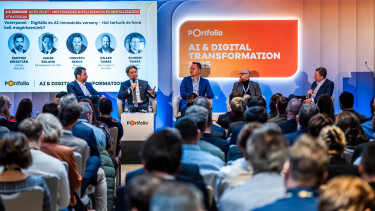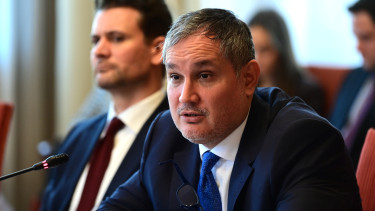Western Europe is now ready, we need to build roads in the East - László Szíjj about Duna Aszfalt expansion plans

When will we catch up with the quality of Austrian roads? We've been hoping for 30 years...
In Austria, 7-8 million tonnes of asphalt are used every year in road renovation and construction, while in Hungary, even with the current motorway construction programmes, we still use only around 3-4 million tonnes, compared to 1.5-2 million tonnes in the past. It also matters how often and to what extent roads are repaired; delaying intervention can lead to further deterioration and is therefore naturally a cost driver. Moreover, a significant proportion of the foundation of our roads were designed for low axle loads and traffic.
It is also not irrelevant what kind of climate is predominant. In colder areas, such as the mountains of Austria, a higher bitumen content can be added to the asphalt to prevent cracking, making it more flexible and resistant to frost. In our country, however, asphalt temperatures can reach up to 60°C in summer. At such temperatures, bitumen softens, asphalt deflects the load, and becomes rutted. Therefore, we have to design the asphalt composition to withstand both conditions. For this reason, if it is only renewed every 20 to 30 years, the pavement will age and require more costly intervention. So, in answer to the question,
we will catch up, or at least reach the quality of Austrian roads within a predictable timeframe, based on our current technological knowledge, if we double the amount of asphalt we lay in the coming years.
So, if we look at the amount of asphalt paved, there is still potential in road construction. Does this mean that the heyday of this business is not over yet?
There is potential in the road construction industry as long as roads are being used, but the "heyday" is yet to come.
Unfortunately, there is still a significant size gap between Hungarian and multinational-owned road construction companies, with the latter being the more favoured, but we are working to reduce this ratio.

Photo by Ákos Stiller/Portfolio
What are the prevailing ratios of road construction to reconstruction in Hungary?
In Hungary, a single road construction program was launched since 2010, resulting in nearly 500 kilometres of new road network and the reinforcement of more than 600 kilometres of roadways to bear an 11.5-ton load by 2020. A few critical roads are still needed to support the country's developing economy, but the essential corridors are now complete. Accordingly, in countries with mature road networks, the ratio of new road construction to renovation is heavily skewed in favour of upgrades. In Hungary, this ratio has recently been around 50-50%. Typically, these processes have been determined by the four-year political cycles, but now we are witnessing a period in which road construction is important; just think of the Hungarian Village Program.
The state is spending hundreds of billions on the reconstruction of lower-ranking roads, which was also very timely. The same can be said for the 2-3-digit main roads leading to motorways.
These roads should be maintained in the same way because the signs of damage will appear sooner or later.
Would a state motorway concession tender provide a framework for this?
Concession is the format that can be used to do this, and it is an excellent way to manage these processes. Usually, there is an agreement for at least 30 years whereby the private investor obtains funding, builds and maintains the road network, and returns it to the state in an excellent condition. So, they make the road, renovate and repave it several times during the operating period. Elsewhere in Europe, we see concession agreements covering much longer periods than 30 years.
In such an arrangement, everyone - the client, the investor, and the industry - is pulling in the same direction; the shorter, four-year cycles have no influence.
Duna Aszfalt is reportedly a strong candidate for this concession. So, where is this process now? What can we know about it?
Yes, I can confirm that
we are interested in the tender, and we would like to be part of the winning consortium in some form, as we are qualified to do so.
We have the necessary professional staff, high-quality technical equipment, machinery fleet, and high-performance asphalt mixing plants.
Why is such a concession good for the state, and why is it worthwhile for investors?
As the owner of the road network, the state has a clear interest in a proper concession contract, as it will be able to maintain and develop its road network from part of the road tolls collected, without having to raise extra funds. However, what many people fail to take into consideration when criticizing the state's most recent concession plans is that the M5 and M6 motorways have also been operating under concession for more than a decade.
I had the opportunity to work as an entrepreneur during the socialist era. I considered the spontaneous privatization of the 1990s, when we sold our road construction companies and, in effect, our domestic market to multinationals, a mistake. In this light,
it was quite challenging to gain ground and take root as a Hungarian business owner against the multinationals.
If our company, like the big road construction companies in Western Europe, could participate in a concession contract and have a stable source of income every year, it would create a sound basis for us to be a long-term participant in the infrastructure building market, both as an investor and as a contractor, thus increasing our international competitiveness. Ultimately, this would also increase the country's international economic viability.
In its October 2021 analysis, Scope Ratings also pointed out the risk that Duna Aszfalt Group's operations are not diversified, making it uncertain whether it can maintain its exceptional profitability. They mention, for example, that 92% of revenues in the first half of this year came from the construction industry and 67% of revenues came from motorway construction. Last year 65% of orders came from state-owned companies.
I am familiar with the Scope Ratings analysis, as I have been with the domestic road construction industry since the mid-1980s. Anyone who knows Duna Group understands that we are trying to increase our diversification to our advantage by exploiting our opportunities to the fullest. This is best analysed over a timeline. I know that our corporate diversification is low compared to a multinational company, but we have become well trained in the domestic market, precisely in the fight against multinationals. I think that Duna Group has nothing to be ashamed of, but now we still have grounds for improvement from a very high level.
That is why I consider the chance of a domestic concession an extraordinary opportunity for Duna Group, which would allow us to stabilize the group's operations in the long term.
Vertical integration is also a current topic at Duna Aszfalt. What is its primary goal?
A very important question in the current environment is how to grow in numbers. One way is to continuously set acquisition targets when we buy other companies. These acquisitions focus on the workforce. There have also been times when we have had to safeguard a work area to avoid competitors luring away our employees. In construction, the focus is now on the workforce.
But to return to the importance of vertical integration, it is not for nothing that we bought a stone quarry in the past and are now purchasing a gravel pit too. At this size of the company, we would be vulnerable if we did not possess these raw materials. Obviously, a healthy balance must be found, which is also vital for the future. A clear example of this is the production of steel products, in which we have been striving for independence for many years. A significant challenge is to plan what prices we can achieve and how we can translate this into our offers while remaining competitive.
You are an old hand in the business. Is there any job or project that you remember most fondly?
I don't have a favourite project, but I consider them all successful, if you like. I'm a lucky man; I can say of many structures, bridges, and roads that we have built or been involved in making them. I admit it's a source of pride. Same with our first asphalt mixing plant. You get attached to these first tangible things because they bring back so many memories.
Unpleasant memories?
There are no such memories because we don't leave bad developments behind. We keep doing them, keep replacing them until they’re done and fixed. Of course, some jobs don't work out the first time, but everything can be corrected, and we pay the dues for these at our own expense.
The business figures for the last few years clearly indicate more of a happy time. In the previous four years, the group's turnover has more than quintupled, profit after tax has increased by two and a half times compared to the 2016 level, and at the same time we have seen profit margins of 15-20% at the firm.
Yes, and I regret that I didn't experience these results when I was younger; I had to wait quite a long time to see this, as I have been in the industry for more than 30 years.
Looking at the revenue figures, 2015-2016 saw fundamental changes in the industry. Unfortunately, this also affected the Duna Aszfalt Group's revenue, with the 2016 revenue down to one quarter of 2015. How do you remember that period?
If anyone looks at the development of Duna Group since the change of the political system, apart from one or two critical years, it has been a linear development. There is no question that
the anomalies around Közgép in 2015 gave us an opportunity for more dynamic growth.
Of course, it is not a coincidence that more than two decades of investment in our infrastructure allowed us to take on a more significant market role with the capitulation of Közgép.
The drop in revenue in 2016 was related to highway construction projects. These projects have a 3-4-year time span, and if the following project does not overlap the previous one, such breaks in the market and in orders may come. But there have been worse periods. For example, between 2000 and 2010, there was much less work available. Therefore, it was harder to generate that revenue then. Nevertheless, the gain of HUF 20-30 billion achieved then was worth HUF 150 billion today in terms of energy invested.
We practically had the whole country ploughed up to win the municipal market.
We invested much energy to have the very best professional reputation. At the time, however, no one was envious of our achievements. But it was precisely this infrastructure spanning the country that enabled us, when the opportunity arose, to increase our market share substantially.
You mentioned that production had increased significantly in the recent period. Is the workforce a problem here too?
After the regime change, a decline in the training sector started. A factor in this was that there was no existing vacuum to produce workers. So, the industry adjusted to this situation, and we are now training the workers ourselves. Engineering training is provided at universities, but
we are fighting a fierce battle to attract young people and offer them suitable, attractive careers.
We have had success in this area. We are investing much energy in talent management and attracting young engineers. We have had a dedicated program for three years now, for example, our Open University project, or our scholarship program, in which 18 students from six universities took part in an intensive 7-month mentoring program this year. In the meantime, technology has advanced enormously, also in our profession. Technologies from three years ago are becoming disposable.
The world-leading 3D, drone, and BIM technology companies have burst into our industry. We are fortunate that by having the experience, we are the only ones in Hungary to apply these modern tools in our projects. Just to give you one example: we can pinpoint the land without any surveyor touching it because we have the new devices.
We are at the point where major foreign players, for example, from America or Norway, are looking to us because we are using their software. More specifically, they modify and update these based on our feedback.
Thanks to modern technologies, we are more accurate, efficient, and better monitored. It allows us to filter out errors and see the actual quantities we need to handle in a highway construction project. The machine can scan the whole worksite in a few days; there are some absolute wonders in the industry today.
Thanks to all this, are we building better, more durable roads today? Not just more expensive ones?
We are building better quality roads much faster, but it does matter what kind of roads the investor expects. We have to make precisely the kind of road that the investors expect us to build. Just to give you one example: it does matter what the load-bearing capacity of these roads is. The roads made 20 or 30 years ago were designed for much lower loads and traffic. Putting an additional asphalt layer on them afterward will only help for a while because the increased traffic and axle loads will erode the older roads.
Duna Group is a group of companies specializing mainly in constructing civil engineering projects. To support society with better and more durable roads, we are constantly researching the field and presenting what we believe are efficiency-enhancing improvements to a wide range of organizations so that investors can choose from better and more efficient technologies.

What are the additional aspects of expansion?
We are very cautious about expansion, based on our experience over the past decades.
Of course, we are constantly looking at good acquisitions. Still, we should also remember when there was not as much work, and many had to let go of their staff. Therefore, we prefer to look for the optimum balance, subcontracting because many companies are suitable for this job, and we like to find good partners. Building a thematic network of partners is also imperative in the developed world.
We have already discussed expanding domestically, but what about international expansion? Is it a realistic option for a Hungarian civil engineering company to grow, and if so, where?
We would like to further strengthen our existing presence abroad, mainly in the neighboring countries, in road construction and civil engineering.
We already have a subsidiary in Poland with solid references and a significant steel plant that is a regular supplier to our operations in Hungary. In addition, that plant has orders from, for example, Iceland, Austria, and Sweden for the production of bridge elements. In Hungary, the capacity of the asphalt mixing network already covers the country, so if we were to grow somewhere, it would be in the regions to the South, where infrastructure still needs to be built to join Europe.
Which countries, in particular, can be considered?
Croatia, Serbia, Slovenia, and Romania are all of interest; we have already had significant orders in the latter country in previous years. However, it is a major dilemma whether to withdraw capacity from Hungary, where it is already scarce, so instead we are looking for companies already operating there and through which we can enter the market. I hope we can tell you about the results soon.
What is the current situation with the other, seemingly exotic African project? How did you get involved, and how huge will this project be?
It is a unique situation for a project that the industry considers "of global economic importance." My former distinguished colleague, László Mosonyi, had ties in Africa; he was in charge of a minor road construction project in Congo, coordinating the activities. Later, he was the one to convince me when an existing concession project was offered for investment, and we finally got on board a few years ago. I am convinced that something extraordinary is happening there, and we are talking about a serious project in Africa. It involves 180 km of road in Congo and Zambia, a border bridge linking the two countries, and border posts. The current southern border crossing has a limited capacity, hence the need to open it up to the east. This is a purely commercial risk concession, with the users paying a toll to the concessionaire at the border crossing. I have always been drawn to complicated, challenging projects; this is one of them.
In light of these foreign expansions, how would you like to see Duna Aszfalt and László Szíjj in 2030?
I have two daughters. I have always wanted a son, and God has given me six grandsons and now a granddaughter. My daughters are less attracted to the full-time demands of managing a group of companies, so
the question arises as to whom to leave the company.
Many Hungarian companies are struggling with generational transitions now. I can only hope that, for example, in 10 years, I will still be able to actively encourage my grandchildren to participate in the management of the group. However, realistically, I strive more to
grow this group to the point where we can pay professional managers who can keep the ownership and management functions well separated.
What is the situation in the Mediterranean? How many yachts do you currently own?
Initially, I had one small boat; then, when I saw that these yachts could be rented out at an excellent price, I invested in two larger ships. The Covid pandemic has made this business more valuable, and I am planning and calculating to move them to the Caribbean for the winter to exploit them over two seasons.
Regular visitors to your yachts include pro-government businesspeople and ministers.
As the owner of a yacht charter company, I have no direct control over who is hiring the yacht and when, or who is the guest of the person hiring the boat,
just as I am not the one who has to negotiate when, for example, someone needs a driveway paved.
What's better about a bigger boat?
My favorite is the first, smallest boat. It gives the same experience as the larger ones.
And it is not followed so closely by photographers.
Yes, and I could rent this one out the cheapest.
Obviously, the yachting business represents a smaller slice of your private investments than the construction industry, but are you involved with private investments in other areas? Or is the domestic road construction business, with its handsome EBITDA margin, holding you back from looking for more significant business opportunities elsewhere, either in agribusiness, retail, or real estate?
I am actively exploring these opportunities. The real estate development market is also a logical option, and I have some hotel interests. These will help us stay afloat; if the economy, and therefore our industry, dry up; we will still need some source of revenue.
I also have technological investments related to the construction industry, for example, through 3D design.
We will also be opening an electrical assembly plant shortly, which, again, is an opportunity to enter a new industry.
Do you still have interests in the bank holding company?
I no longer have a substantial interest. Of course, suppose the concession bid goes in our favor. In that case, the project will require a massive amount of resources, so I may need a solid financial partner to execute it.
So, you maintain a strong interest in the construction industry with or without a concession, and therefore a strong link with the state since the state is the client in road construction?
There are no private sector clients who want to build motorways. And, in my opinion, there is no way to make a living out of other private contracting. This is the case everywhere, as the states are responsible for maintaining and building roads. In this country, some governments favor international contractors, while others favor those with a Hungarian background, and the public tendering practice in Western Europe is also an excellent example of this.
From this point of view, there is a risk for the operation of Duna Aszfalt if we look at next year's elections.
Even before 2010, the current representatives of the Fidesz-KDNP government said that they wanted to improve the share of domestic companies in public investments, based on the country's well-understood interests, following the example of France, Germany, and Austria, where the percentage of domestic companies in public investments is between 70 and 80, or even 90 percent. Recently, I read that this is still just over 50% in our country. Incidentally, before 2010, we were also making progress under left-wing governments for 16 years.
Today, there is perhaps no question in anyone's mind that Hungary has been able to make unprecedented progress compared to itself in road development over the last ten years.
There is not a single motorway construction program in Europe like the one currently underway in Hungary. Western Europe is now ready in this respect, and this is where we need to build.

Cover photo: dunaaszfalt.hu












